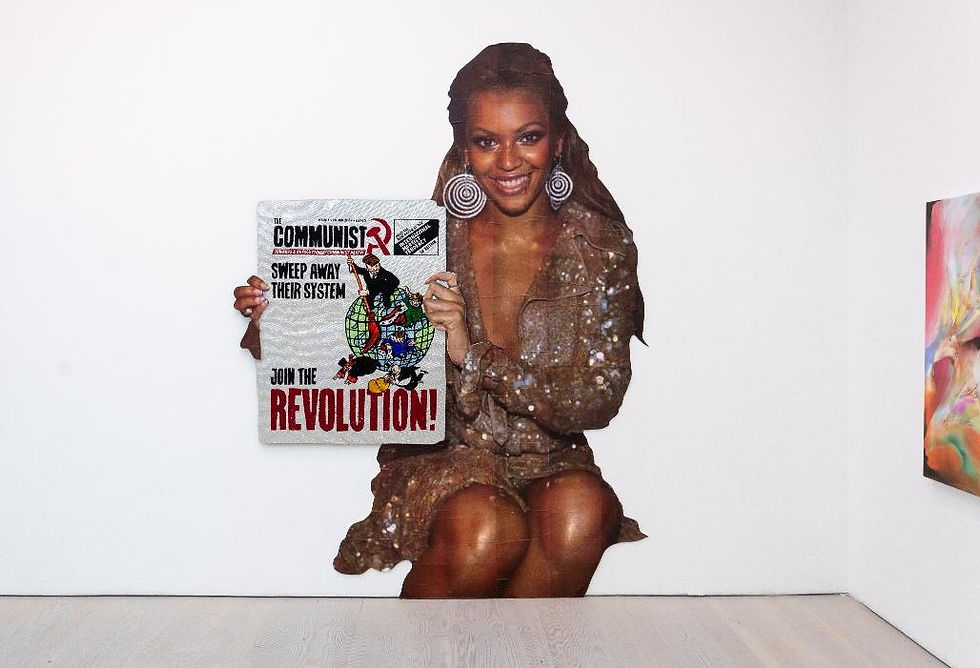THE POWER, PERSEVERANCE AND PEOPLE OF PALESTINE AT P21 GALLERY
- Erin Hill
- May 17, 2024
- 5 min read
Updated: May 22, 2024
We Are Not Numbers (WANN) takes over the P21 Gallery in the heart of Bloomsbury, London to champion Arabian life and culture in a show dedicated to their work as a non-profit organisation. The writing project brings Palestinian voices to the forefront of Western discourse through physical and visual artistic narratives. WANN invites visitors on a journey through the beauty and reality of Palestinian life and culture via vivid personal narratives from native Palestinians, old and young, widowed or orphaned, with particular interest in shedding light on the ongoing persecution of the Palestinian people.

Installation shot courtesy of Sabrina Merolla
WANN is a non-profit organisation that connects Palestinians with writing mentors to support the production of personal stories and narratives. These pieces range from reflections on childhood and day-to-day life in Palestinian suburbs to the horrors of warfare and the struggle of survival within war-torn areas. The show, fittingly and simply entitled We Are Not Numbers, provides just a snippet of stories from a vast collection of over 350 Palestinian writers including a portrait polaroid dedicated to each and every one. Each story has a corresponding name and face. Each writer’s voice can be heard loud and clear. And the sights, sounds and scents of Palestine can be vividly experienced through every single narrative.

Installation shot courtesy of Sabrina Merolla
The opening night of We Are Not Numbers invited a collection of speakers to discuss the importance of the show and the work of WANN. Political advocate and candidate for Ilford North, London, Leanne Mohammed, hosted this segment of the evening and introduced us to the WANN organisation, its ethos and international projects. Journalist Ahmed Alnaouq followed to provide us with deeper insight into the beginnings of WANN as well as his personal experiences growing up in war-torn Gaza. As he tells us, WANN was instigated in 2015 following an abundance of attacks on the Gaza strip across July and August of 2014. The project aims to raise funds to support the Palestinian population whilst producing written works that “tell the human stories behind the statistics we read in the news.”
Two of WANN’s writers, Hala Shoman and Malak Mattar, were also invited to speak on their experiences and delivered incredibly touching accounts of their lives in Palestine and their subsequent reactions to the global support for Palestine. Shoman instigated the conversation by boldly and honestly addressing the crowd: “You are all complicit because you are all important. Your actions are important.” She highlighted the value of Western support against Palestinian persecution and referred to this idea of the gallery space being a tool for both education and protest and a space.
Matt Kennard provided some words as head investigator of the news outlet Declassified UK, a media organisation covering UK foreign policy, military and intelligence agencies. In reference to WANN Kennard rightfully noted that “what they do, straightforwardly, is a crucial act of resistance.” A surprise final guest speaker was ex-Labour Party leader Jeremy Corbyn who gave a compelling speech on unity, community, and resilience, championing WANN and visitors of the show for their support for Palestinian people and emphasising the importance of celebrating and preserving Palestinian culture, traditions, and, ultimately, people.

Installation shot courtesy of Sabrina Merolla
I found the most touching pieces to be the ones that were the most human yet the most painful. A number of narratives discussed the lives of children and young people across the Gaza strip - the area of Palestine most ravaged by violence - who have become accustomed to living in, frankly, horrifying conditions. WANN’s youngest writers discuss the normality of waiting in the dark during frequent power cuts or patiently waiting for bombing to subside in order to play outside amongst rubble and death. Instead of drawing sunny beaches or family/friends get-togethers, Palestinian children draw figures with guns on destroyed streets.
One detail of the exhibition is showcasing how language has adapted to the horrors of its speakers environments. The Arabic word toukh is used by Palestinian children to refer to the sound of gunfire and bombs, described by writer Nedaa Al-Abadlah in her piece Stay Human And Keep Your Home Inside (2018) as an opposite to the usual childhood fear of thunder.

It is this waiting that the children of Palestine are so accustomed to that strikes fear in WANN’s mentors. During the exhibition’s opening night, a collection of speakers were invited to discuss their work. Two of the project's mentors, John Metson and Nick Appleyard, spoke on the production of WANN’s stories and narratives and provided insight into the support Westerners can provide. They also highlighted the fear they felt during the radio silence of their own mentees following an air strike and the helplessness felt as they awaited confirmation of their safety. Many of the written works in this show exhibit a chilling juxtaposition between the normality and mundanity of Palestinian life with the constant haunting of the fact that violence is just around the corner at all times.

An significant aspect of We Are Not Numbers is the fact that each work is a piece of written word. In overhearing WANN’s co-founder Ahmed Alnaouq correct ‘artists’ to ‘writers’ in reference to the participants of the show, I initiate a debate into the definition and classification of art itself. I am of the firm belief that the written word is most definitely a form of art and can and must be featured in art shows and exhibitions. Thus, allowing for writers to be fairly and correctly classified as artists in their own right. WANN writer Nesreen Hussain expands: “Storytelling has the power to challenge misinterpretation and stereotyping, and indeed the deliberate erasure of the Palestinian narrative and history.” Whilst paint can bring out the vivid imagery and visuality of the world, words have the power to shape our opinion, thoughts and memory, and summon the most challenging experiences and unspoken realities. In a way, the way in which we use language provides insight into one’s soul and core identity.
The physical engagement provided by some of the exhibit’s stories provided even greater immersion into the stories of their writers. P21 Gallery’s basement featured interactive stories which allowed for visitors to literally look past the faces of the writers to see into their mind and soul through their writing by lifting transparent sheets featuring images of Palestinian citizens. Having visited a number of P21 Gallery exhibitions, I can say with confidence that they are an art and culture space that is pioneering the evolution of the art gallery experience into something fresh and informative yet still deeply moving and intimate. We Are Not Numbers is just one example of the potential power and influence of the art gallery space to continue connecting, educating, and advocating.
From left to right: Nada Hammad, A Love Letter To Gaza, 2016, Various Quotes. Installation shot courtesy of P21 Gallery
The We Are Not Numbers exhibition provided a vital and fresh experience of the gallery space whilst championing the artistic possibilities of the written word. This show provided a platform for Palestinian voices to not only address the reality of living through such intense violence, but to reveal the reality and normality of Palestinian life outside of warfare and persecution. WANN invites viewers to celebrate what it means to be Palestinian and to experience what it’s like to grow up and live day-to-day in Palestine.
We Are Not Numbers was shown at P21 Gallery from 2 May to 11 May 2024.







